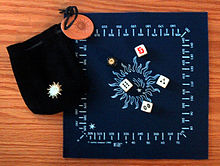- Cosmic Wimpout
-
Cosmic Wimpout is a dice game produced by C3, Inc in 1976.[1] The game is played with five custom dice, and may use a combination score board and rolling surface, in the form of a piece of cloth or felt available in various colors and designs. Players supply their own game piece for score keeping.
The game of Cosmic Wimpout has often been associated with the Berkeley, Grateful Dead[2], and other free-form subcultures.[citation needed] An annual tournament takes place at the Green River Festival in Greenfield, Massachusetts.
Contents
Gameplay
The Cosmic Wimpout dice are referred to as "cubes." The general rules for the game have evolved since its inception and there have been various minor modifications made to the colors and patterns of the face designs on the cubes.
The game is played by rolling all five cubes and adding up the player's score. Any fives or tens rolled are worth that amount. Rolling three of a kind of any number is a "flash" - the swirls are twos, the triangular glyphs are three, the lightning bolts are four, and the stars are sixes. A flash scores ten times the number of one of the dice in the flash. For example, rolling three twos is worth 20 points, and rolling three fives is worth fifty. When a player rolls scoring dice, they must set them aside, and may choose to either keep the points they have, or to roll the non scoring dice and try for more points.
There are three exceptions to this general guideline, which force rolls in certain cases:
- Whenever all five have been set aside as scoring, a player must reroll all of them. This rule is known as "You May Not Want To But You Must", or "YMNWTBYM."
- When a player has less than 35 points overall (this is called "getting into the game"), all non-scoring dice must be rerolled.
- When a player rolls a flash, they must then "clear the flash" by rolling all remaining non-scoring dice (the "Futtless Rule"), until none of the dice match the Flash (the "Re-Roll Clause").
If a player rolls the dice and no points at all are scored, that player has "wimped out".>If the player rolled all five cubes and scores no points, this is a "train wreck". In any case, the player loses all points gained in that round.[1] Herein lies most of the game's strategy: if a player keeps the points they get, those points are "safe" for the remainder of the game, and the player's score cannot drop below that value, house rules notwithstanding.[3]
In his 2007 essay on the game, game designer Andrew Looney described Cosmic Wimpout as the "single most influential game I've ever played" and that the game "has a clean, elegant set of rules that allows losing players to feel they still have a chance at a come-from-behind victory."[1] Looney cites Cosmic Wimpout's influence from a French dice game called Dix Mille (Ten Thousand) and names other versions/variations of the game such as Bupkis, Greed, Farkle, and Zonk.[1]
Variations
Cosmic Wimpout was created with the ability to modify or add additional rules while playing, known as the Guiding Light[3], given the consensus of all of the players. For example, some players use the Full House rule,[4] which states that if a player rolls a flash, and rolls a pair with your remaining two die, they must roll again.
Another variation is the Cosmic Sampler variation, which featured in an electronic version for the Palm. A Sampler is when none of the dice on any roll match, similar to a large straight in Yahtzee. Scoring for a Sampler is 25 points.
References
- ^ a b c d Looney, Andrew (2007). "Cosmic Wimpout". In Lowder, James. Hobby Games: The 100 Best. Green Ronin Publishing. pp. 69–72. ISBN 978-1-932442-96-0
- ^ Sawyer, Keith (2007). Group Genius: The Creative Power of Collaboration. Westview Press. pp. 214. ISBN 9780465071920
- ^ a b "Cosmic Wimpout Rulebook". C3 Inc.. http://cosmicwimpout.com/howtoplay.html.
- ^ "The Guiding Light". C3 Inc.. http://cosmicwimpout.com/morerules.html.
Related games
External links
- Official Cosmic Wimpout website
- Cosmic Wimpout at BoardGameGeek
Categories:- Dice games
Wikimedia Foundation. 2010.

